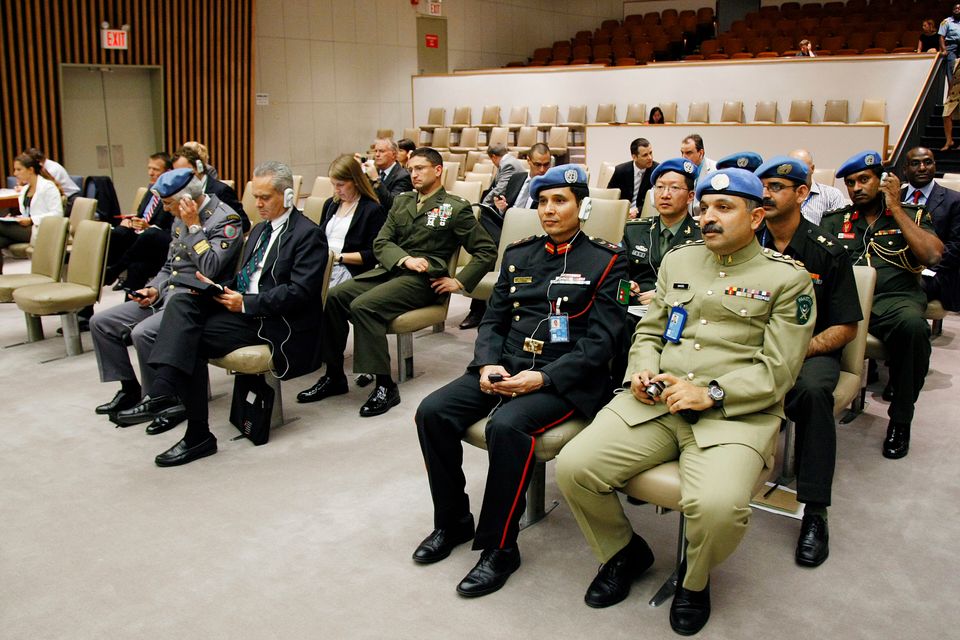UK endorses Declaration of Shared Commitments as part of Secretary-General's Action for Peacekeeping Initiative
Statement by Ambassador Karen Pierce, UK Permanent Representative to the United Nations, at the Security Council Briefing on Peacekeeping.

Madam President, thank you for holding this important debate today and thank you to the Under-Secretary-General and Ms Blakemore for the briefing.
I think there’s been huge amounts of progress on the peacekeeping agenda in the last ten years and there have been some important successes. At the same time, Sarah Blakemore’s testimony reminds us that there is a long way to go. But I think it would be right to start by joining my Swedish colleague in commending the 100,000 UN uniformed peacekeepers and the 14,000 civilian peacekeepers and their commitment to delivering international peace and security. The vast majority of these men and women are courageous and they operate in incredibly challenging conditions. As the Undersecretary-General mentioned, 138 lost their lives last year, and we pay tribute to their sacrifice and we thank their families for allowing them to do the very difficult jobs that they do.
We the Council are responsible for their deployment. We need to do our utmost to improve the safety and security of all peacekeepers and make sure that peacekeeping is as effective and efficient as possible. We need to get the best possible impact from the $7 billion dollars we spend annually on UN peacekeeping. But I also want to say that we need to have multi-dimensional peacekeeping. I don’t agree that missions should not look at human rights and humanitarian - these are conflict drivers. They are root causes. They need to be fixed and we cannot turn the clock back on that so we need military, political and development solutions.
The Secretary-General’s Action for Peacekeeping Initiative provides the basis for making a reality of getting more impact for our money. We’re proud to have endorsed the Declaration of Shared Commitments on UN peacekeeping and we encourage other member states to join.
I’d like to highlight, if I may, four particular areas where I think we should concentrate our efforts to have peacekeeping be more effective.
Firstly, getting it right from the start which is about planning. The Council has an important role to play in improving performance. That starts with the mandates we authorize; these need to be realistic, achievable and developed on the basis of frank advice from the Secretariat but also robust debate by the Council. In turn, we look to the Secretariat to use our peacekeeping resources effectively and to match capabilities to requirements. We often talk about the UN breaking down silos. I would just recall that in Darfur, there are some 27 different UN entities on the ground so this requires coordination, it requires planning, it requires a comparative advantage approach, and it requires a UN-wide approach.
Secondly, making sure it works. A number of speakers this morning have drawn attention to the critical importance of performance. Peacekeepers on the ground need to be equipped, capable and willing to do the job we ask of them. This means we need to strengthen training both before deployment and as troops are in the field. We need a light coordination mechanism on training to be made operational as quickly as possible and this mechanism needs to enable better matching up of those that can provide capacity building and equipment and those that need support.
As the Under-Secretary-General mentioned we need to do more than pay lip service to the role of women. We should make this a priority. Madam President, at the London Defence Ministerial, some 63 countries, including many in this room, called for a doubling of the number of women in military and police contingents by 2020. I hope we can all play a part in making this a reality. For the UK’s part, we have launched WPS Chiefs of Defence Staff Network and we hope that this will promote ways to integrate gender perspectives into military planning and operations and hence improve numbers.
Thirdly is the feedback loop, checking that we know what works and continuous improvement. This means Madam President, a robust and objective evaluation of mission performance. As you said, processes must be transparent and we need better accountability. Between us, we have huge amounts of knowledge to draw on and I hope the Secretariat will be able to speed up the development of a comprehensive performance policy.
Fourthly, when we get it wrong. The failure to be transparent to maintain a culture of accountability can lead to shocking abuses, as Ms. Blakemore was able to outline today. We strongly support the Secretary-General’s zero tolerance policy and we look to its implementation. United Kingdom has provided about $3 million to support the Secretary-General’s efforts and our voluntary funding has improved system-wide coordination, enabled robust vetting and mandatory pre-deployment training. It’s also important that we have good communications so that we can focus on providing redress to victims.
In conclusion Madam President, we need to be confident that our peacekeeping missions are fulfilling their mandates to protect civilians and we must be equally confident that they are fulfilling their duty to protect our own mission personnel. So we need to fulfil our own duty to ensure that these missions are supported and given the necessary resources so they can do their jobs. Thank you very much.